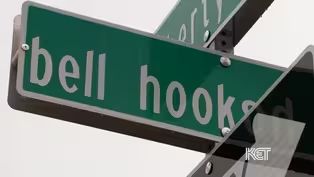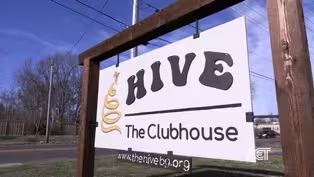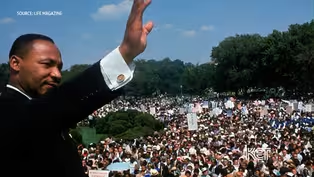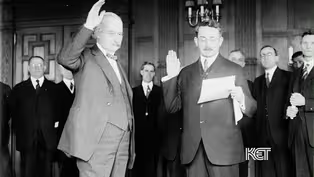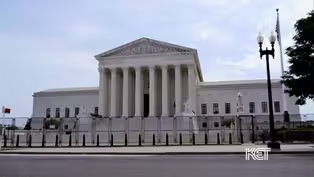
Felon Voting
Clip: Season 2 Episode 197 | 3m 37sVideo has Closed Captions
Restoring voting rights to formerly incarcerated Kentuckians finds bipartisan support.
Efforts to restore voting rights to formerly incarcerated Kentuckians finds support from lawmakers on both sides of the aisle in Frankfort.
Problems playing video? | Closed Captioning Feedback
Problems playing video? | Closed Captioning Feedback
Kentucky Edition is a local public television program presented by KET

Felon Voting
Clip: Season 2 Episode 197 | 3m 37sVideo has Closed Captions
Efforts to restore voting rights to formerly incarcerated Kentuckians finds support from lawmakers on both sides of the aisle in Frankfort.
Problems playing video? | Closed Captioning Feedback
How to Watch Kentucky Edition
Kentucky Edition is available to stream on pbs.org and the free PBS App, available on iPhone, Apple TV, Android TV, Android smartphones, Amazon Fire TV, Amazon Fire Tablet, Roku, Samsung Smart TV, and Vizio.
Providing Support for PBS.org
Learn Moreabout PBS online sponsorshipIn 2019, Governor Andy Beshear restored voting rights to over 140,000 Kentuckians who have been convicted of nonviolent felonies but served their time in Kentucky.
There are still over 100,000 formerly incarcerated people who cannot vote.
Lawmakers on both sides of the aisle say it's time for change.
Here's more from Kentucky Edition's Clayton Dalton as we begin tonight's legislative update.
I didn't believe having a productive life was possible because of the way I was treated by the legal system.
How was treated in prison and how I was treated after prison?
Kentucky is one of less than ten states that permanently bars people with felony convictions from voting.
Marcus Jackson, who served time in prison, said being stripped of the right to vote made him feel ostracized.
I never knew that I lost my right to vote because of the conviction.
I really wasn't planning to vote, but finding out that it was taken for the rest of my life reinforced my belief that I did not have a place in this world.
Once the mistake was made and I was labeled a felon, the only people and places willing to accept me were the people and places I needed to be the least.
I never felt like myself with certain people or in certain places, but it was better to be accepted somewhere.
Didn't know where at all.
Couture Heron, a Democrat from Louisville, sponsored the bill.
A similar measure in 2020 gathered support from members of both parties.
That bipartisan support remains today.
One of the things that makes this country so great is our right to vote.
And what I wish is that there were more people in this world fighting for the right to vote.
And I supported this several years ago.
And I support this again now.
And if you have done your time and it's part of becoming a fully functioning, contributing member of our society is getting your rights back.
And making you a full person.
And part of that is serving in this democracy and making your vote.
So let's get this passed.
House Bill 566 restores other civil rights, including the chance to serve on a jury and run for public office.
But those rights wouldn't be restored until five years after a person's release.
The five year wait period feels arbitrary to me.
I think there might be a three year proposal somewhere in the legislature right now.
Would you speak to how that was settled on that?
There's a wait period at all.
And then what?
The time period should be.
I will say that I am open to have a no wait for the civil rights portion or putting a weight onto it.
However, I am not willing to waiver on the automatic restoration for the vote.
Supporters say the bill is collectively good for society.
According to the most recent report from the Sentencing Project, nearly 162,000 citizens cannot vote despite the governor's 2019 executive order.
That's four and a half percent of the total voting eligible population in Kentucky and 11 and a half percent of voting eligible African-Americans.
The most sacred principle of democracy is that individuals be allowed to have a voice and how they are governed.
The right to vote grounds all other rights, empowering citizens to become participants in government rather than mere petitioners.
If the bill reaches final passage, Kentucky voters will have the final say, choosing whether to amend Kentucky's Constitution by a ballot initiative.
House Bill 566 is still awaiting its first vote.
For Kentucky Edition, I'm Clayton Dalton.
According to Kentucky's current constitution, an executive pardon is the only way a person with a felony can have their voting rights restored.
Video has Closed Captions
Clip: S2 Ep197 | 3m 15s | A new street sign graces downtown Hopkinsville in honor of native daughter bell hooks. (3m 15s)
Video has Closed Captions
Clip: S2 Ep197 | 4m 18s | The Kentucky Cancer Program is encouraging people to wear blue all month. (4m 18s)
Video has Closed Captions
Clip: S2 Ep197 | 3m 51s | The Hive offers resources for adults with intellectual and developmental disabilities. (3m 51s)
Video has Closed Captions
Clip: S2 Ep197 | 3m 6s | Frazier Museum commemorates the 60th anniversary of the March on Frankfort. (3m 6s)
This Week in KY History (3/4/2024)
Video has Closed Captions
Clip: S2 Ep197 | 1m 58s | A look back at this week in Kentucky's history. (1m 58s)
Video has Closed Captions
Clip: S2 Ep197 | 3m 8s | UK law professor on SCOTUS ruling restoring Donald Trump to Colorado election ballot. (3m 8s)
Providing Support for PBS.org
Learn Moreabout PBS online sponsorship
- News and Public Affairs

Top journalists deliver compelling original analysis of the hour's headlines.

- News and Public Affairs

FRONTLINE is investigative journalism that questions, explains and changes our world.












Support for PBS provided by:
Kentucky Edition is a local public television program presented by KET
